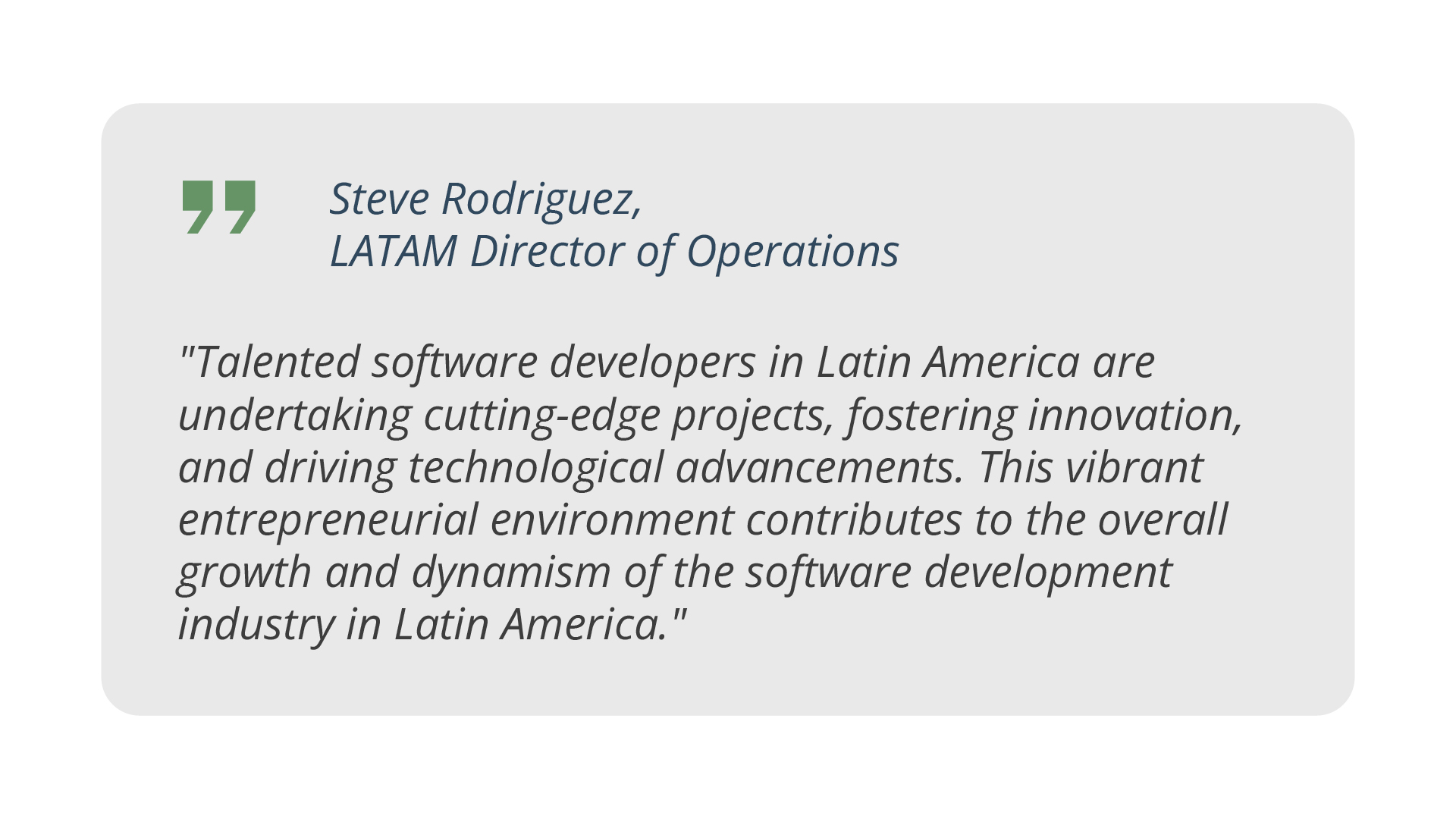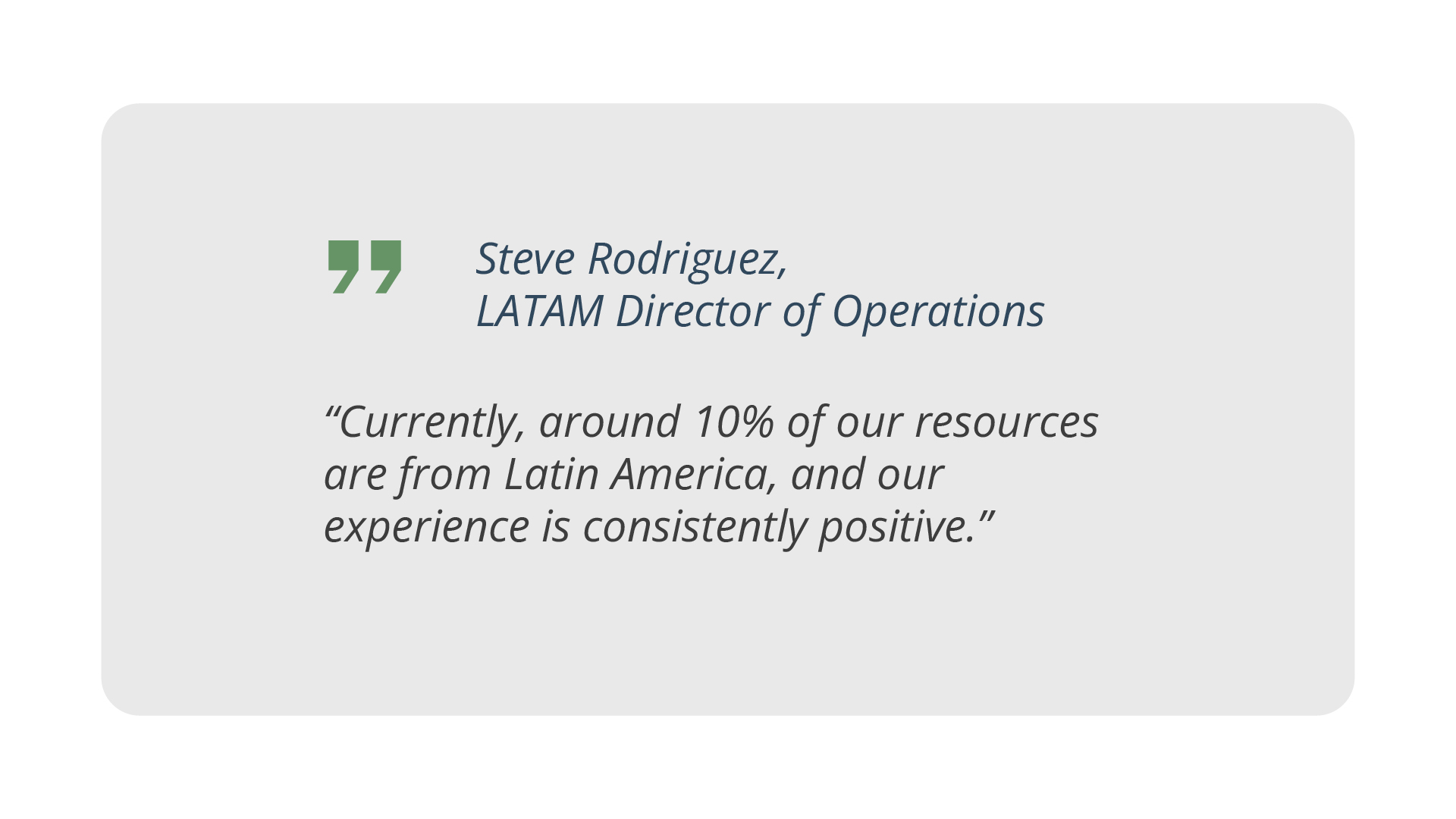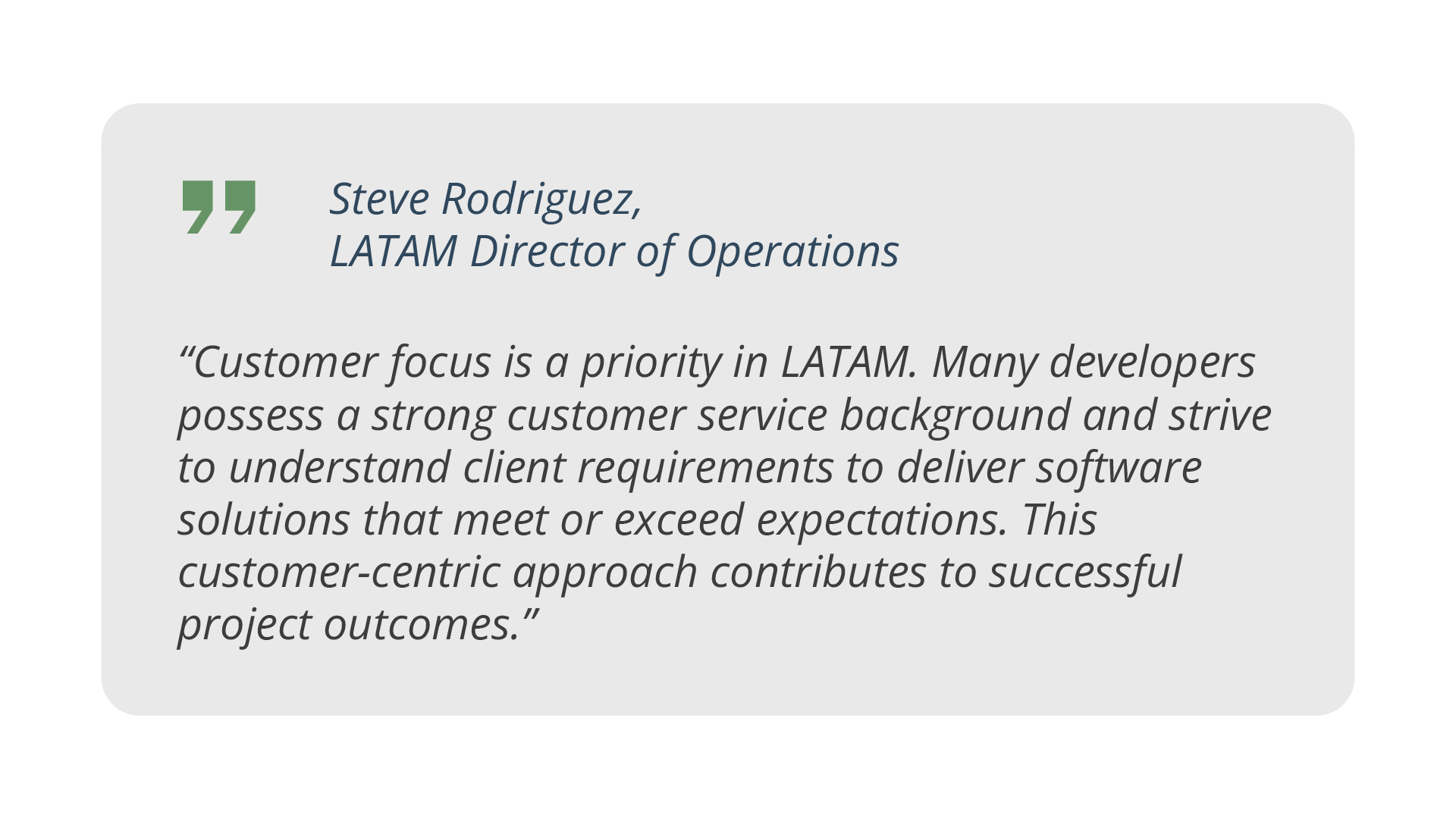
In a recent interview, our LATAM Director of Operations, Steve Rodriguez, a key figure behind Kanda’s growth in the region, shared insights into his role and contributions to the company’s success. With a background in software development, network security, project management, and economics, Steve brings a unique combination of expertise and experience required to navigate the different countries’ environments in the region, each with their specific challenges and opportunities.
Focusing on strengthening business relationships and valuing the organization’s people, Steve plays a vital role in Kanda’s continuous growth. From expanding Kanda’s footprint in Latin America to ensuring positive customer experiences and supporting talent acquisition, Steve’s efforts are driving success in the region.
The software development industry in Latin America is currently experiencing significant growth and maturation. Countries such as Argentina, Brazil, Mexico, Colombia, Chile, and Costa Rica have emerged as key players in the global software development market. Even smaller countries such as Paraguay, Guatemala, El Salvador, and Ecuador have also attracted interest from multinational corporations.
There are several trends in Latin American software development that are worth mentioning:
The Latin American region has a solid workforce that continues to grow together with the expert knowledge base. This is no secret for big players in the industry which generates a direct impact on Latin American software developers who are sought after for their expertise and capabilities in delivering high-quality services.
This trend is growing in popularity due to cultural affinity and a very convenient geographical proximity to North American time zones. This facilitates communication and collaboration between USA companies and their Latin American counterparts, resulting in smoother project management and execution.
Developers in the region are proficient in a wide range of programming languages and technologies, including JavaScript (Node.js, React, Angular), Java, Python, .NET, as well as emerging technologies like blockchain, machine learning, and cloud technologies.
Talented software developers in Latin America are undertaking cutting-edge projects, fostering innovation, and driving technological advancements. This vibrant entrepreneurial environment contributes to the overall growth and dynamism of the software development industry in Latin America.
By embracing these approaches, companies can improve collaboration, accelerate development cycles, and ensure the production of higher quality software products. This shift towards agile practices in Latin America enhances efficiency and responsiveness in project execution, giving the workforce a competitive edge.
Currently, around 10% of our resources are from Latin America, and our experience is consistently positive. Hiring developers from Latin America involves considering several important factors.
Look for talent whose skills align with your verticals and services to ensure that they have the necessary expertise.
It is important to ensure that an employee has strong English language proficiency and communication skills.
Examining the resources’ previous projects and feedback from clients will give you insights into their ability to successfully deliver.
We also take into account the challenges that may arise in the region.
Ten percent of our customers work with top-quality engineers on our Latin American team. With these engineers, we are able to cover a wide range of technologies and verticals. Consistently receiving positive feedback has allowed us to expand our nearshore capabilities with additional positions. We are striving to significantly increase revenue sourcing from Latin America in the next 18 months.
Latin American software developers demonstrate their excellence and competitive advantage across various industries:
In HealthTech, Latin American developers show expertise in developing healthcare management systems, telemedicine platforms, electronic health records (EHR), and medical data analysis tools.
In finance/banking/FinTech, Latin American developers excel in building secure payment gateways, mobile banking applications, cryptocurrency platforms, and other financial software solutions.
Latin American developers have also gained significant expertise in the e-commerce sector, constructing robust and scalable platforms tailored to the unique requirements of online retail.
Within the travel and hospitality industry, Latin American developers create booking and reservation systems, hotel management software, travel apps, and customer relationship management (CRM) tools.
Leveraging their strategic location and active trade, Latin American developers contribute to the growth of logistics and supply chain solutions, including inventory management systems, supply chain optimization tools, and logistics tracking platforms.
Lastly, in education, Latin American developers leverage technology to develop e-learning platforms, virtual classroom solutions, educational games, and learning management systems.
Proficiency and specialization in these industries make Latin American software developers highly sought-after in the global market.
Several Latin American countries have implemented government incentives and support programs to encourage the growth of the software development industry. These programs play a crucial role in attracting investment, promoting innovation, and nurturing the growth of the software development industry in the region.
Governments offer tax incentives to software development companies, such as reduced corporate tax rates or exemptions for certain periods. Grants and subsidies promote research and development activities in the software industry, as well as support innovation, talent development, and the adoption of emerging technologies.
Additionally, startup incubators, accelerators, and public-private partnerships foster the growth of the software industry and support early-stage software companies. These programs provide mentoring, funding, networking opportunities, and access to resources to help startups succeed.
Last but not least, governments invest in educational initiatives to develop a skilled workforce in the software development field. They may establish specialized training programs, coding boot camps, or partnerships with universities to promote relevant skills.
Some examples of specific government support programs and organizations by country include Prodetur in Guatemala, Procomer in Costa Rica, Proesa in El Salvador, Polo IT & Argentina IT in Argentina, Brazil Software in Brazil, Prosoft in Mexico, and Apps.co in Colombia.
Latin America is a region with rich cultural diversity. Developers from different backgrounds bring unique perspectives and experiences to software development projects. This diversity fosters creativity and encourages the exploration of different ideas and approaches.
LATAM developers are known for their strong work ethic and commitment to delivering quality work. They often have a dedicated and diligent approach to their tasks, resulting in reliable and efficient project execution.
LATAM culture emphasizes collaboration and communication. Teamwork is natural for developers in the region, who value open communication and are skilled at working in multidisciplinary teams. LATAM resources actively engage in exchanges and share ideas to drive innovation and problem-solving.
 LATAM developers often demonstrate adaptability and flexibility in their work. This is part of the regional DNA, as challenging environments have made them open to learning new technologies, methodologies, and approaches. This adaptability enables them to quickly embrace changing project requirements and deliver optimal solutions.
LATAM developers often demonstrate adaptability and flexibility in their work. This is part of the regional DNA, as challenging environments have made them open to learning new technologies, methodologies, and approaches. This adaptability enables them to quickly embrace changing project requirements and deliver optimal solutions.
LATAM culture fosters creativity and innovation, and developers in the region bring a unique perspective to software development. They often think outside the box to find cost-efficient solutions to complex problems.
Customer focus is a priority in LATAM. Many developers possess a strong customer service background and strive to understand client requirements to deliver software solutions that meet or exceed expectations. This customer-centric approach contributes to successful project outcomes.
Proactive problem-solving is a differentiator in LATAM. The competition with other regions, where LATAM is outnumbered by available talent in the market, fosters proactivity in identifying and addressing challenges. Finding solutions and proposing improvements contributes to efficient and smooth project execution.



